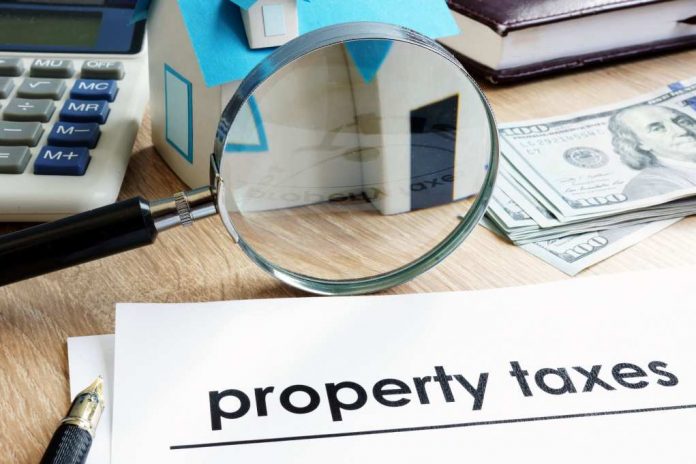
When it comes to finding a place to live, there are so many factors to consider. One especially important factor that can get overlooked are the taxes that come along with a home! One of the biggest taxes that people deal with include property taxes. But you surely don’t want to move somewhere where these taxes could cost you a fortune. Each state has different rates and policies which is why it’s important to take these taxes into consideration before you make a move. We’ve put together a list of five states that have the country’s lowest tax rates. It’s important to read through our list before you buy a property anywhere.
The Basics of Property Taxes
Property taxes are what you pay every year based on how much your land or house is worth. Think of it as a yearly rent you pay to the city or town for public things like schools, parks, and safety services. Here’s how it works:
- Property worth: A person from the local government, called an assessor, will check out your property and decide its value. This value is not always what you might sell your house for today but is a number the city uses for taxes.
- Tax Rate: Once the assessor decides on a value, the city applies a tax rate to figure out how much you owe. Let’s say your house is worth $200,000, and the tax rate is 1.5%. That means you would pay $3,000 in property taxes that year.
Different cities and towns might have higher or lower tax rates based on what they need money for. Plus, your property’s value might go up or down over the years, so the amount you pay in property taxes can change. Some states offer a better deal than others, charging less in property taxes. So if you’re looking to get the most bang for your buck, it’s important to know which states are at the top of the list.
The Leading States for Low Property Taxes
Now that we’ve got a basic idea about property taxes, let’s check out five states that offer some of the best rates.
1. Hawaii
Hawaii, often celebrated for its sun-kissed beaches and breathtaking landscapes, is more than just a tropical paradise. Beyond the occasional volcanic activity, it’s worth noting that the Aloha State boasts one of the lowest property tax rates in the nation. With a property tax rate of just 0.29%, and a median home value of roughly $662,100, the annual tax responsibility stands at approximately $1,920. So, while the islands beckon with their natural beauty, it’s essential to consider the broader financial benefits.
2. Alabama
Alabama, known for its rich cultural history and warm southern charm, offers homeowners more than just a hospitable environment. With an average effective property tax rate of only 0.41% and a median home value of $157,100, residents typically pay an annual tax of about $644. Financially speaking, Alabama presents an enticing proposition with its low property tax rates. This affordability, combined with the state’s diverse landscapes and communities, makes Alabama an attractive option for many potential homeowners.
3. Colorado
Nestled amidst the Rocky Mountains, Colorado offers a blend of urban pizazz and natural landscape. For homeowners, there’s another reason Colorado shines – its relatively modest property tax rate. The state has set an average effective property tax rate at 0.51%. When applied to the median home value, which is pegged at $397,500, this translates to an annual tax liability of around $2,027.
4. Nevada
Nevada is mostly known for its bustling nightlife in Las Vegas and its desert landscapes. But for potential home buyers there is more than meets the eye. Nevada’s average effective property tax rate stands at 0.55%. When this rate is applied to its median home value of $315,900, it results in an estimated annual tax of $1,737. For those considering the Silver State this is a key financial highlight for the nightlife.
5. Louisiana
With its rich tapestry of culture, music, and cuisine, Louisiana has long been a destination for both tourists and potential homeowners. The Bayou State boasts an average effective property tax rate of 0.56%. With a median home value standing at $174,000, this rate means homeowners can expect an annual tax bill of around $974. Given these numbers, it’s clear to see the financial advantage. Louisiana’s attractive tax rate makes it a compelling option for those considering a home investment.
(FAQs) About Property Taxes
How often is a property assessed for tax purposes?
The frequency varies by locality, but properties are typically reassessed every 1-5 years.
Is there a way to lower my property tax bill?
You can often appeal the assessed value of your home if you believe it’s been overvalued. Additionally, many localities offer exemptions or reductions for certain groups, such as seniors or veterans.
What happens if I don’t pay my property taxes?
Non-payment can result in penalties, interest, and even a tax lien on your property. If left unpaid for an extended period, the local government could potentially sell the lien or even foreclose on the property.
Does renovating or expanding my home affect property taxes?
Generally, significant renovations or additions can increase the value of your home, which might lead to a higher property tax bill following the next assessment.
In Closing
In the end, buying a home isn’t just about numbers; it’s about finding a place that feels right. This home will be where you can build memories, and where you can envision a future. By equipping yourself with knowledge and understanding your financial landscape, you’re well on your way to making that vision a reality. While these states have their perks, it’s important to keep in mind other factors such as the cost of living, job opportunities and more when deciding where to settle. By looking at what life is like and what each state has to offer, you can better see where you fit. So whether you’re drawn to the beaches of Hawaii or mountains of Colorado, there’s a perfect place out there for everyone. Let’s hope you find yours!
















